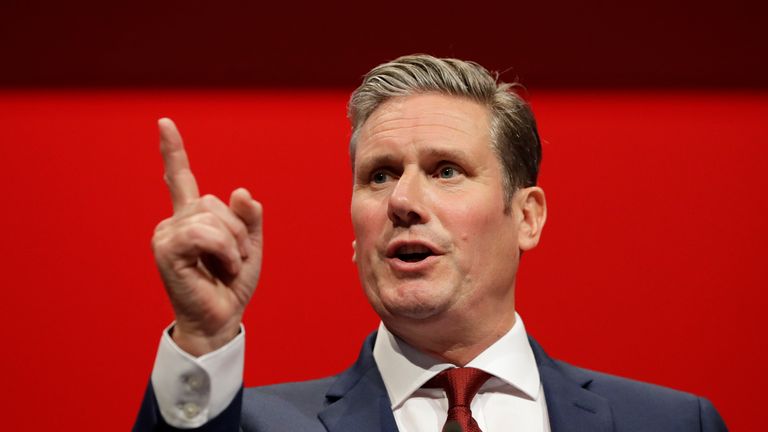Keir Starmer is 59 years old being born in 1962. At the age of 16 he joined the East Surrey Young Socialists. His political links would later be effected, shaped and initially somewhat restricted by his move into University studies. He obtained a first class honours degree in Law at Leeds University in 1985. Then he moved into post graduate studies at Oxford University obtaining a Barrister and Civil Law Degree. However at Oxford from 1986 to 1987 he edited "Socialist Alternatives" which was an international revolutionary Marxist Journal which was strongly critical of Kinnock's Labour leadership.
He then embarked upon a legal carrier which especially as time developed came to place restrictions on his having clear party political links. He first became a Barrister with Middle Temple and then in 2002 a Queen's Council. From 2003 to 2008 he also served as Human Rights advisor to the Northern Ireland Policing Board. He was also Director of Public Prosecutions from 2005 until 2013 becoming head of the Crown Prosecution Service.
In 2013 he finally placed himself in a position where he could re-join the Labour Party at Holborn and St. Pancras. He did this as he wished to become their local MP. Frank Dobson the sitting MP was due to retire , but Keir needed a year's recent membership of the Labour Party in order to be able to seek nomination as a parliamentary candidate. Frank, therefore, delayed the announcement of his coming retirement to allow Keir time to qualify. In the meantime, Keir was knighted.
Keir was selected as Labour candidate in December 2014, then elected as local MP at the 2015 and the 2019 General Elections. He became leader of the Labour Party on 4 April 2020. Just over five years after he had finally rejoined the Labour Party following a considerable gap. So his recent membership only covers a period approachng eight years.

The best indication of his political stance does not come from his recent speach at the Labour Party Conference, but from his Fabian pamphlet which appeared as Conference was due to commence. It is entitled "The Road Ahead". It raises two questions. (1) Is it election winning material ? (2) Does it have support amongst the declining Labour membership, plus attractions for the general public? I will initially stress what I see as two problematic elements in his Fabian analysis.
(A) Whilst he makes a commitment to updating our existing public services, especially in the areas of education and health, he is not in favour of further expanding the public sector. This would be understandable if he felt that tackling other key problems such as Climate Change and Covid had to take priority, but he also seems to be committed even in the long term to fully linking with existing private enterprise. For he refers in his introduction to a future Labour Government working "in partnership with a brilliant and innovative private sector to create good jobs and harness the potential of technology". He later on page 5 adds that the "next Labour Government will be focused on creating jobs people are proud of, reimagining our public services for those who use them, creating a new and better relationship with business and delivering world-class health and education." This is to "build an effective partnership of state and private sector to prioritise the things we have seen really matter." (page 13). In a key section entitled "A New Deal for Business and Working People" (pages 20 to 22) he starts by opposing "a throwback to the planned economies of the 20th century". Yet it would, of course, be possible for us to learn to overcome past shortcomings.
(B) On page 7 he starts a heavy criticism of nationalism. Saying that "forces pushing apart our country and tearing at the social fabric - nationalism, extemism and misinformation - need to be tackled, but have been embraced or ignored by Conservative and Scottish Nationalist governments" On page 17 he adds "Most immediately damaging to our country has been the rise of the multi-headed hydra of nationalism'' and his concluding point is - 'We are proudly patriotic but we reject the divisiveness of nationalism" Yet I feel that whilst many of us might have wished that Scottish and Welsh nationalism had not gained there current degree of support, unlike Starmer we have often tended to look for avenues of compromise and improvement in which some form of federalism will meet the needs of people to have both a greater say over political operations in their homelands. It is interesting, however, that Starmer makes no reference to the needs of Northern Ireland, despite his past links with the area.
On the more positive side on page 21 he says that - "In the first 100 days of the next Labour Government, it will sign into law a New Deal for Working People... across the country, with improved conditions, quality jobs, training and better pay" including an increased minimum wage and increases in workers rights from day one. Whilst also replacing universal credit and changing our social security system to ensure that work pays and the low-paid keep more of the money they earn.
For me the three key massive and immediate political issues we face are the tackling of Climate Change, containing the impact of Covid and tackling wide areas of social injustice. Yet these are only issues which Starmer touches upon now and again in his Fabian analysis and they are easily overshadowed by the matters I cover in tems (A) and (B) above. His Fabian publication is entitled "The Road Ahead" but it raises more questions than it answers.
24 resolutions were carried at Labours Conference, many of them going well beyond the scope of Starmer's Fabian proposals. See - https://labourlist.org/2021/10/labour-conference-2021-the-content-of-every-policy-motion-and-how-it-passed/
1 comment:
Note this recent analysis which expands upon the points I raised about Starmer - https://www.jacobinmag.com/2022/05/keir-starmer-uk-labour-party-political-chameleon-book-review?fbclid=IwAR2PFyBP-a-wNXJ6sTgP_kXnW0oavTDN329D4ORMOsq9wIUhga6f6sqXlzY
Post a Comment